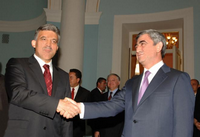In a major diplomatic breakthrough, Turkey and Armenia declared their intent to restore relations and open their sealed border in a joint statement issued last week. Under Swiss auspices, the two countries outlined their collective plan to sign into action two protocols, one restoring diplomatic relations and the other to establish bilateral ties within six weeks. According to the joint statement, the protocols will enter into force only after they have been ratified by both countries' parliaments.
The joint declaration marks the culmination of rapprochement efforts that began with Turkish President Abdullah Gül's "football diplomacy" visit to Yerevan in September 2008. Those efforts were soon stalled by the chronic political contentions surrounding historic Ottoman-Armenian genocide claims and the status of Nagorno-Karabakh, an Armenian-supported breakaway province of Azerbaijan. Turkey's demonstrated persistence on engaging Armenia reveals its commitment to enhancing its image as a regional statesman, as well as its abiding strategic security concerns and economic interests in resolving the conflicts of the Caucasus.
Turkey closed its border with Armenia in 1993 to protest Armenia's support of the independence claims of Azerbaijan's ethnically Armenian enclave of Nagorno-Karabakh. That gesture of solidarity and Turkey's subsequent insistence that any rapprochement with Armenia be conditioned on a resolution of the Nagorno-Karabakh conflict have been Baku's biggest asset in the Karabakh negotiations, giving the joint declaration to reopen the border profound symbolic significance. Ankara has faced mounting political pressures from Azerbaijan throughout the latest rapproachement efforts with Armenia. Baku insisted that any bilateral agreements or border opening without preconditions would preclude a favorable resolution to the Karabakh conflict. Ankara's decision to move forward with the diplomatic protocols while the Karabakh issue remains largely unresolved has been a rallying point for Turkish opposition party leaders and a source of skepticism in Baku.

